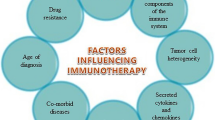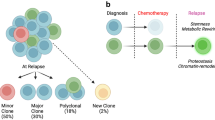Abstract
Despite improvements in neurosurgical and neuroradiotherapeutic techniques, children with malignant brain tumors have a dismal prognosis. In an attempt to improve the efficacy of cytotoxic therapy, dose intensification of effective chemotherapeutic agents followed by autologous bone marrow transplantation (BMT) has been tried. Between May 1991 and August 1996, high-dose chemotherapy and autologous BMT were administered to 11 children with malignant brain tumors: 10 had recurrent (n=8) or progressive (n=2) disease, and 1 was treated before progression. The histological diagnoses were medulloblastoma (3), glioblastoma multiforme (2), supratentorial PNET (2), ependymoma (2), anaplastic astrocytoma (1), and anaplastic oligodendroglioma (1). In 6 of the 11 patients measurable disease was present at the time of BMT. The preparative regimen included BCNU 600 mg/m2and VP16 1500 mg/m2in 5 cases, and thiotepa 900 mg/m2and VP16 1500 mg/m2in 6 cases. The median times to achieve a neutrophil count over 0.5×109/l and a platelet count over 50×109/l were 14 and 28 days, respectively. The overall incidence of severe toxicity (grade III–IV) was 18% and consisted of oropharyngeal mucositis and diarrhea. Among the 6 patients with measurable disease at the time of BMT there were 2 with stable disease, whereas 4 patients had tumor progression: all these patients died of tumor recurrence 2–10 months after BMT. Five patients in whom there was no evidence of disease at the time of BMT are alive and free of progression with a median follow-up of 20 months (range 3–67). These preliminary results show that high-dose chemotherapy and BMT may be effective in children with malignant brain tumors. Etoposide-containing regimens seem to have significant activity in this setting, and the toxicity was manageable. The most important variable prognostic for progression-free survival is the disease status at the time of transplantation.
Similar content being viewed by others
Author information
Authors and Affiliations
Additional information
Received: 5 May 1997 Revised: 25 August 1997
Rights and permissions
About this article
Cite this article
Busca, A., Miniero, R., Besenzon, L. et al. Etoposide-containing regimens with autologous bone marrow transplantation in children with malignant brain tumors. Child’s Nerv Syst 13, 572–577 (1997). https://doi.org/10.1007/s003810050142
Published:
Issue Date:
DOI: https://doi.org/10.1007/s003810050142




